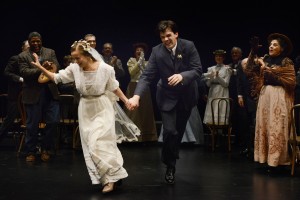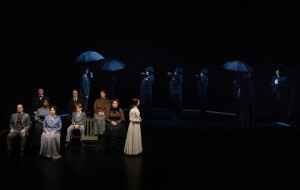Pittsburgh Public Theater’s season has begun, and like last year, I’ll be writing about seeing the various shows there. Last night Brad and I saw “Our Town” by Thornton Wilder. I’ve got to write about it this way- “Brad and I saw…” because going to the theater together and talking about the show has become an important thing for us. I watch, and I’m always thinking about what I’m going to write. He just thinks about the show he is seeing. Depending upon the show he might or might not have gone on his own- and we have fun talking about our perspectives. Date night!
Wilder’s Our Town was first produced in 1938, and represents a major departure from other theater of its time. There is a bare stage with very few set pieces like tables, chairs and ladders used to help conjure up the various sets and scenes of the play. The actors mime all of their actions like snapping beans, tossing newspapers, or sipping strawberry ice-cream sodas. The play is set in three acts and covers a time period of about 15 years in the life of the town of Grover’s Corner, New Hampshire.
I was embarrassed because I had never seen this show, and can’t even remember reading it, although Brad was in the same place, and many of his very cultured clients expressed the same thing. As we ate before the show, I used Google to try and learn a bit about it. Had I made a mistake deciding to see all of the season? This show didn’t sound like I’d be at all interested. I was tired and I didn’t think I really wanted to spend my evening in a theater seat, but here we were, and seeing the show was amazing. I can’t wait to see what a theater critic has to say about the production, but I know both Brad and I loved it.
Last season we saw shows like “Other Desert Cities” which went fro 0 to 60 in about two minutes and stayed ramped up for the duration of the show. Our Town isn’t like that at all, and I couldn’t help be feel impressed at the way Wilder craftily pulls you in. I cried at the end, which may not be that big of a deal, as I cry easily, but it says a lot for someone who was dreading the rest of the show after the first act. But by the middle of the second act, I was hooked, and grateful for everything that had come before.This isn’t a show which hits you over the head emotionally or intellectually, but a show that invites you in and then gets inside of you.
I loved the set for the show, a simple, square shaped floor space backed by black curtains, and demarcated with a very white rigid circle about the width of the square. It reminded me of a white line painted down the center of a highway, where the solid line means do not cross. In the three acts, I had a different perception of the circle. In the first, the circle seemed suffocating and restrictive. In the second, it seemed comforting and supporting, and in the latter it was like a wall keeping us, the audience out. Or perhaps keeping all of the living out. It was visually sting and beautiful and deceivingly simple.
My all-time favorite moment of the show is in the second act where, George announces that he is making up his mind, right then and there to not go away to agricultural college. But this is a show where the dialogue and the story telling are meant to take center stage, so there are many wonderful moments. Since I’m writing this, as a gay man seeing a play, it intrigued me which moments were the one where I felt “included” or “excluded.” The scene of the two adolescents talking from open windows or the scene at the soda fountain may seem too heterosexual, but the reality is these are moments where the universal quality of human-ness radiates through. We are all not the same and we are all the same at the same time. How’s that for a profound statement. Or is it pure bull shit?
 I tend to think that people have always been about the same, but I began to question that in a big way in each act. For example, in the third act, the Stage Manager, who narrates to the audience, talks about the New Hampshire men buried “over there” who died in the Civil War. These men were willing to fight and die for a cause and a country- few if any of them had ever travelled more than 50 miles from home. I think about how passionate about LGBTQ Civil Rights, and if push came to shove, would I die for Justice? I think so, however my resolve and my passion is fueled so much by where I have been (all around the globe) as well as the wealth of experiences I’ve had with people everywhere. These civil war dead, struck me in a new and powerful way. And they aren’t even central to the story. Or are they?
I tend to think that people have always been about the same, but I began to question that in a big way in each act. For example, in the third act, the Stage Manager, who narrates to the audience, talks about the New Hampshire men buried “over there” who died in the Civil War. These men were willing to fight and die for a cause and a country- few if any of them had ever travelled more than 50 miles from home. I think about how passionate about LGBTQ Civil Rights, and if push came to shove, would I die for Justice? I think so, however my resolve and my passion is fueled so much by where I have been (all around the globe) as well as the wealth of experiences I’ve had with people everywhere. These civil war dead, struck me in a new and powerful way. And they aren’t even central to the story. Or are they?Yes, I always look for the gay character in the show, and this one was no different. Is it the church organist? Is it Mr Webb? Is it George? Or could there even be a gay character at all? So much of sexual identity, and self awareness are based on our willingness to ask questions and seek to see how we are different. Yet this play is very much about a community of people who blindly replicate life based on the roles and attitudes expected of them all.
Grover’s Corner has no culture, and practically nothing at all to do. Mundane activities fill days like snapping beans, delivering milk, and choir practice. Yet even here where there are no real distractions to be fully present in one’s life, it seems no one really see each other and relishes what it means to be alive. Is Wilder telling us how much we are all wasting our entire lives. Wilder pokes fun of the desires we each have- those things we believe we need or another needs to be happy and complete. Poignant to me was Mr Gibbs who sells an item of furniture so she can afford for her husband the doctor to “go away and rest” and be healthy. She however precedes him in passing, after she catches pneumonia while away visiting family. The legacy helps the children buy equipment for the farm, yet the perfection of this watering system can’t make their lives heartache free. Those who claim that modernity has robbed the American nuclear family of joy and happiness, take note. Even in this distraction free world of the turn of the century, it was not a happier life. Not as the luddites want you to think.

Yet as George lay on the ground sobbing, I couldn’t help believe that his mother had it all wrong. It is not only the dead who grasp the truth.
Gay, Lesbian, Bi, Trans, and Queer persons belong in theater seats. It is easy to see our lives, situations, and struggles for full equality as enough drama without adding it by seeing a show. But we miss valuable opportunities to see bigger pictures, contextualize our perspectives and understand our lives and the lives of others who are like us or not like us. We are all the same, yet we are also all different, at the same time. That’s something deserving of our attention.
Our Town runs until October 27th. Here’s more information and tickets.